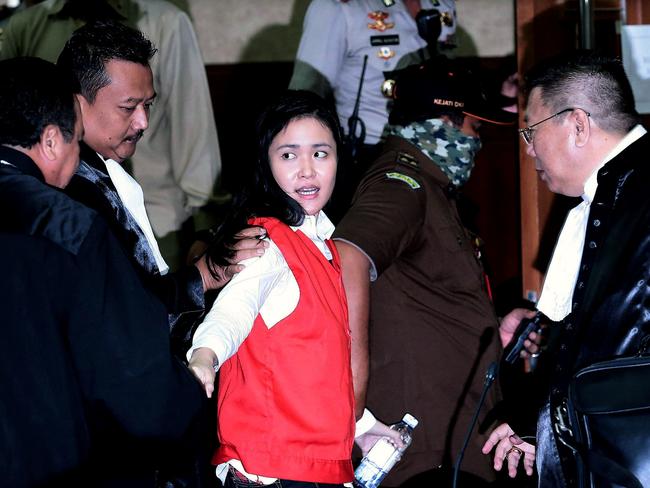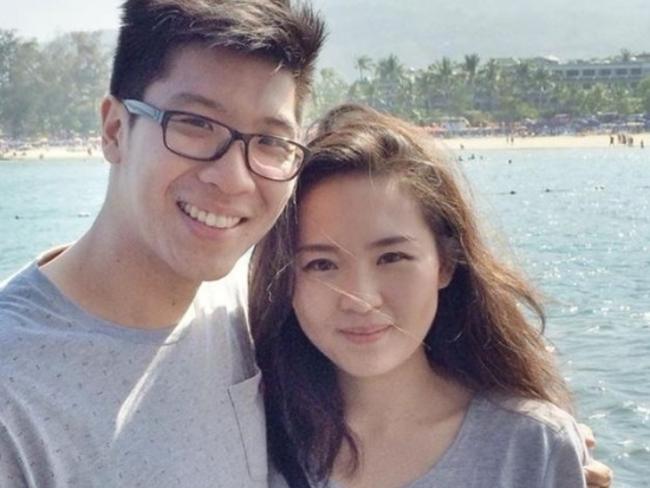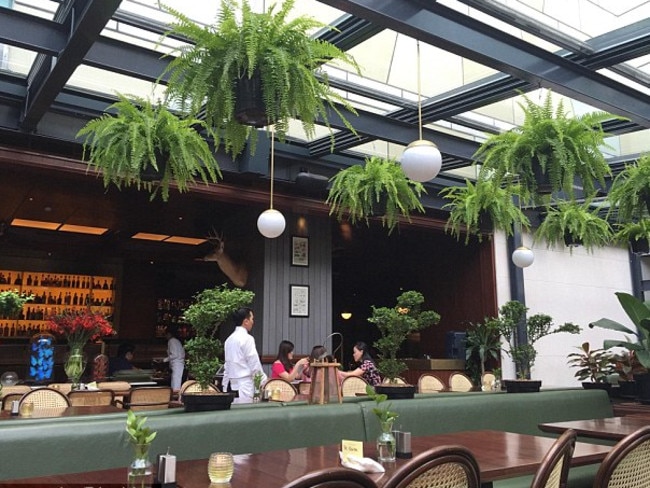Inside the murder trial of Jessica Kumala Wongso accused of killing her friend Wayan Mirna Salihin with a cyanide-laced iced coffee
IT has the trappings of a crime thriller: friendship gone bad, a beautiful victim, an attractive alleged killer, a cyanide-laced iced coffee. This is the trial captivating Indonesia.

WHEN Wayan Mirna Salihin arrived at the upscale Café Olivier her friend from college days was already there.
“This is for you Mir, you said you wanted this,” Jessica Kumala Wongso said, referring to a glass of Vietnamese iced coffee she had ordered and paid for.
Mirna was slightly taken aback, questioning why her friend had ordered the drink well before her arrival, but thanked her nonetheless.
The two young women, along with a third female friend, Hani, had arranged a catch up in the popular restaurant inside one of Jakarta’s glitzy shopping malls. They had all studied together in Sydney in their college days, where they had continued to live.
Mirna took her Vietnamese iced coffee, swirled it around with the straw and took a sip. She started waving her hand in front of her mouth. “Bad. This is awful,” she said, offering the drink to her friend Jessica, who declined to try it. Hani took a small sip and agreed it was dreadful. It was bitter, hot and spicy.
Two minutes went by. Mirna started convulsing, foam coming from her mouth. She fainted. Hani screamed her friend’s name to wake her.

Cafe Olivier staff rushed over to help and Mirna was taken to hospital. For 15 minutes doctors tried to resuscitate the young woman but it was no use. At 6.30pm that evening Mirna was declared dead.
Table 54 at Café Olivier was a crime scene.
For the past six months something akin to a soap opera has played out in Indonesia as authorities discovered the iced coffee had been poisoned with cyanide. Mirna’s death was not an accident.
It wasn’t long before a suspect was declared and Indonesia’s media went into overdrive with rumours and speculation. The case has captivated the nation amid swirling and salacious claims of lesbian affairs between the two young women and a love triangle. The Australian Federal Police were called in to assist with the investigation and provide information about the women’s lives in Australia.
Jessica Wongso now stands accused of murdering her friend by adding deadly poison to her drink — premeditated murder which carries the death penalty. When the trial resumes on July 12 the first witnesses against her will be called. The defence has already put their view on the record — the motive is absurd.

The case had its genesis in Sydney where Jessica and Mirna studied together. They both completed a Bachelor of Design at the Billy Blue College of Design in 2008 and then remained there. The degrees were in partnership with Swinburne University in Melbourne but neither of the young women ever studied or lived in Melbourne. Mirna’s twin sister Sandy also studied and lived in Sydney. Arief Soemarko, who Mirna married in a Bali wedding last November, lived in Melbourne.
After finishing her degree Jessica worked as a graphic designer at Ambulance NSW.
According to the Prosecution’s indictment, read out on the first day of the murder trial this month, it is alleged that in mid-2015 Mirna gave her friend some relationship advice about Jessica’s then boyfriend.
“The victim Mirna suggested to the defendant to break up with her boyfriend who was often rough and a drug user. She asked why date a bad person who doesn’t have any capital,” Prosecutor Ardito Muwardi told the court. He said that Jessica became angered and embittered by her friend’s advice and decided to cut off contact with her.

Jessica later did split with the boyfriend and, the court has heard, then faced legal incidents and charges, including traffic and driving matters for which she appeared in court in Australia.
“The defendant became more offended toward Mirna so to avenge her bitterness, the defendant made a plan to kill Mirna,” Mr Muwardi said. To carry out her revenge she re-established contact with Mirna and arranged to meet her and two other friends from their Sydney days in the Jakarta cafe.
The prosecution claims Jessica’s actions on the day and hours leading up to Mirna’s bizarre and horrific death point to her guilt. It is alleged she arrived at Café Olivier at 3.30pm, well ahead of the scheduled meeting time, looked around the restaurant and then went to a nearby shop to buy three soaps, asking for them to be placed in three separate paper bags.
Coming back at 4.14pm she chose Table 54 before going to the counter to order and pay for the iced coffee and two cocktails. The drinks were delivered at 4.24pm.
Prosecutors allege that after this Jessica moved her position and then placed the three paper bags containing the soaps in a position to block views of the iced coffee from the cafe’s CCTV cameras. Prosecutors allege that sometime between 4.30 and 4.45pm Jessica added cyanide to the iced coffee and then moved the paper bags off the table and onto the couch.
Jessica’s lawyers however point out there are no witnesses who saw her place anything in the glass of coffee or saw her in possession of the cyanide that day or any day and indeed there is no evidence of her ever procuring it.

Forensic tests showed that the amount of cyanide in the coffee was 298mg — more than enough to kill a woman of Mirna’s size.
Jessica has no less than 15 lawyers representing her in the trial. They say the allegations against her are baseless and the boyfriend-advice motive is absurd.
“It does not make sense that Jessica flew all the way from Australia to Indonesia to murder Mirna. It also does not make sense that Jessica would murder Mirna because she had once asked Jessica to end her relationship with her boyfriend at the time,” lawyer Sordame Purba told the court in his reply to the prosecution case.
The defence also wants to know why the first and only suspect in the case is Jessica. What about the third woman there that day, Hani, who also took a sip of the coffee but suffered no ill effects?
The defence also suggests the cafe staff and the barista could also have been potential suspects.
“Why is Jessica the only one suspected of murder when she did not do anything unusual and nobody witnessed her putting cyanide into the coffee?” Mr Purba asked the Judges.
From day one every aspect of the case has been dissected by the media and a public with an appetite for scandal. Even Café Olivier has become a ghoulish attraction for those to who want to visit the scene of the crime and try a coffee.

After Jessica’s arrest Jakarta police conducted a reconstruction of the crime, using those involved to act out what happened that day. Mirna was played by a member of the cafe staff.
One issue was the colour of the iced coffee. When it was delivered to the table it was dark in colour, the cafe staff said, the way it should be.
But when Mirna took the fatal sips it was a yellow colour. At the reconstruction four cups were placed on the table to compare discolouration.
In the early days of the case rumours swirled about lesbian affairs and love triangles. It has since all been discounted as rubbish but there were claims that both women may have been lesbians, or that Jessica was jealous of her friend’s husband, Arief Soemarko.
A false Instagram account, in Jessica’s name, was even circulating at one stage, where she purportedly said she was bisexual. “The first person I told I wss bisexual was my ex boyfriend … I told him I fell in love with a woman once.” It was a fake was later proved to have nothing to do with her.

Mirna’s heartbroken father, Darmawan Salihin, has vowed to ensure justice is done for his little girl. He suggests that the truth will be outed when the CCTV taken from Café Olivier that day is played to the court. In one lengthy interview, with an Indonesian television network earlier in the year, he suggested his daughter had long felt uncomfortable around Jessica. Mr Salihin said that frequently in Australia she had asked her husband, sister or friend Hani to come with her each time she met up with Jessica.
Tensions are now running high. On the first court appearance the staff from Mr Salihin’s courier company carried banners describing Jessica as a murderer and calling for the death penalty.
But a deal between the Australian and Indonesian Governments may not allow that to be the final chapter. Before the Australian Federal Police could agree to provide information about the lives of the two women in Sydney and also about Jessica’s criminal record, they received a guarantee from Indonesia that the death penalty would neither be sought nor applied in the case.
That has since been questioned. The Judges and the Prosecution have both reacted defiantly in the face of the inter-Government deal, saying they are impartial, cannot and will not be dictated to by anybody when it comes to sentence.
Before then Indonesians will again be glued to the media as every minute detail of the coffee murder is played out before them.



